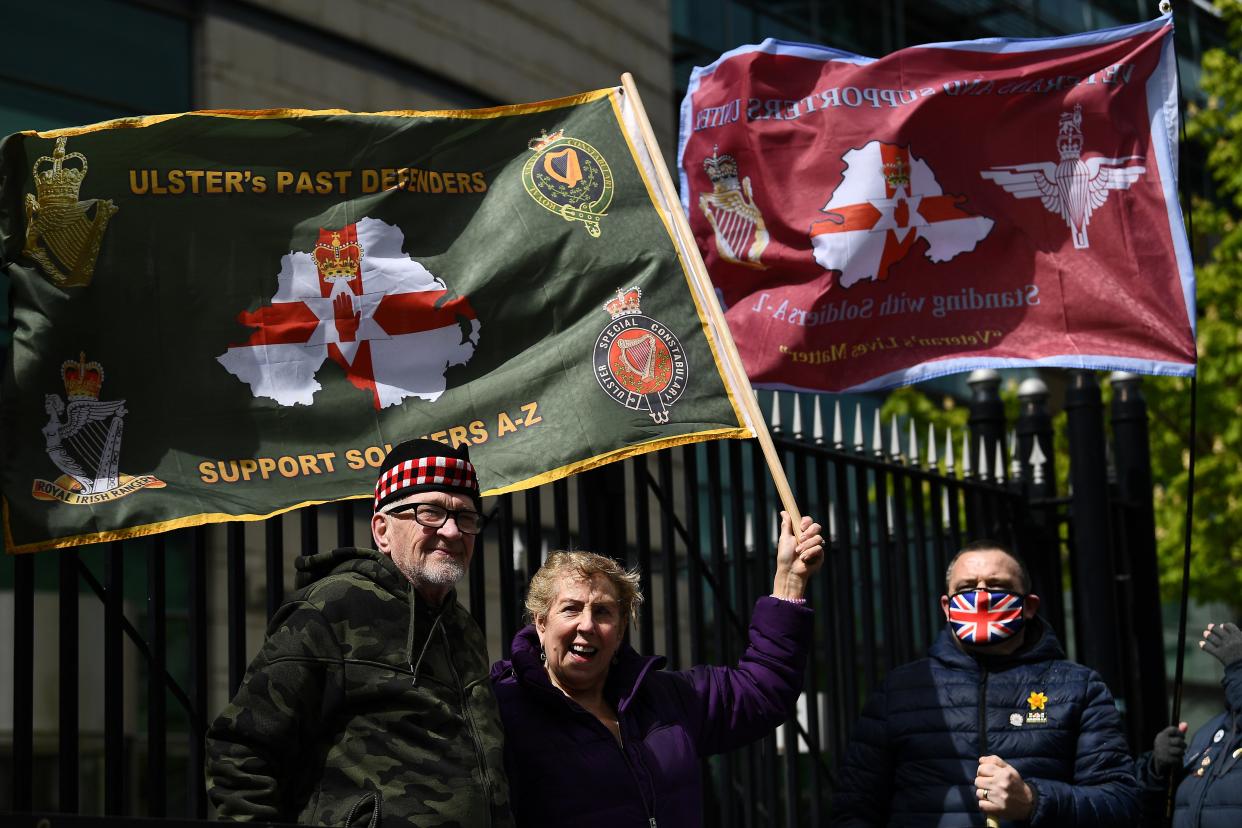Joe McCann: Trial collapse leaves accused paratroopers relieved and IRA commander’s family seeking justice

People hold flags outside Belfast’s Laganside Courts during the trial into the 1972 killing of official IRA member Joe McCann, on Tuesday (4 May)
(Reuters)The collapse of the trial of the two British Army paratroopers accused of murdering IRA member Joe McCann has brought to an end a prosecution which has been hugely controversial both legally and politically.
There will be relief for the defendants, Soldier A and Soldier C, both now in their seventies, at not having to face a long court case with the possibility of convictions at the end. But the decision by Mr Justice O’Hara at Belfast Criminal Court has left Mr McCann’s family angry, embittered and pledging to continue to seek justice.
The trial, about a killing which took place in 1972 during the years of the Troubles, also comes at a time when violence has again resurfaced in Northern Ireland in an echo of those dark times of strife. It also comes just before the marching season when there is real fear of disturbances after years of relative calm.
It was fairly obvious during the proceedings last Friday that the case may finish quickly. The two soldiers had made statements after the shooting and then interviewed by the police’s legacy unit, the Historic Enquiries Team (HET), in 2010. It was this evidence which formed key parts of the prosecution case, and when the judge ruled it inadmissible, the prosecution had effectively hit a dead end. They had until Tuesday to appeal against the decision, and chose not to do so.
Speaking outside court, Mr McCann’s daughter Aíne said there had been "a failure of the state at all levels" over the death of her father. “The RUC [Royal Ulster Constabulary] failed, the criminal justice failed, not only in this case but in the case of many other families,” she said.
The family’s solicitor, Niall Murphy, added: “This ruling does not acquit the state of murder. Today is not the end of the McCanns’ journey for justice.”
There will be an appeal to the attorney general to open an inquest into the death which would have the power of bringing in a verdict of unlawful killing, if it found that was the case.
Lawyers for the two paratroopers declared that the prosecution should “never have got off the ground” and called for an inquiry led by a senior judge to investigate “the decision-making process and to ensure that the decision to prosecute these veterans was not political”.
The deputy director of prosecutions, Michael Agnew, insists, however, that the procedures had been brought after a “very thorough and careful examination” by senior lawyers and he remained “satisfied” that it was right to bring it before the courts.
But, at the same time, Mr Agnew stated that the prosecution service “fully respected” the judge’s ruling and acknowledged “the enduring pain of the McCann family and how difficult this development has been for them”.
Both the prosecution service and the police say they will wait for the written judgment before deciding what to do about the four remaining legacy cases. It seems unlikely, at this stage, that prosecutions on these will continue, but accusations and recriminations over what has taken place are unlikely to fade away soon.
Read More
Thousands of bodies dug up from medieval graveyard to make way for HS2
Help the Hungry: Inside our social kitchen as we get set to tackle food poverty
Number of adults experiencing depression more than doubles during pandemic, figures show

 Yahoo News
Yahoo News 
